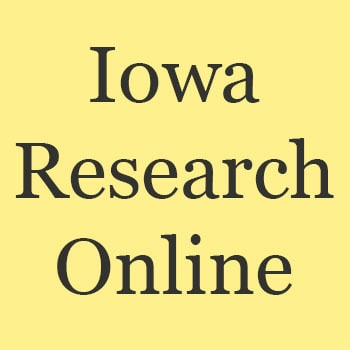By far the most heavily used collection in Iowa Research Online are our theses and dissertations. Most of the items in the collection are from the last decade, either from graduates who voluntarily submitted their thesis electronically or dating from after December 1999 graduation when electronic submission required by the Graduate College for all non-M.F.AContinue reading “Use of Older Theses”
Category Archives: Iowa Research Online
Dada/Surrealism re-launched
We are very excited that after a hiatus of over twenty years, the journal Dada/Surrealism has been relaunched. It is a peer-reviewed, open-access electronic journal sponsored by the Association for the Study of Dada and Surrealism and published by the International Dada Archive, University of Iowa Libraries, with managing editor Tim Shipe. The newest issue focusesContinue reading “Dada/Surrealism re-launched”
Little Village archive
We recently added the back content of Little Village magazine in our repository, which will ensure this important local title will remain widely accessible (http://ir.uiowa.edu/littlevillage/). Many of the contributors are current or past University of Iowa faculty, students and employees. Several months ago, Little Village staff contacted the University Archives to scan back issues ofContinue reading “Little Village archive”
One million
As of July 15, 2012, Iowa Research Online has had over 1,000,000 download of items. This means there have been 1,000,000 uses of University of Iowa faculty, staff and student created or supported content in the just over 3.5 years since IRO launched (January, 2009). More than half of this use occurred in the lastContinue reading “One million”
New site broadcasts the cumulative impact of the UI Political Science Department’s Shambaugh Conferences
Access to lectures and academic papers from the Benjamin F. Shambaugh Conference is now available at http://ir.uiowa.edu/shambaugh/. The conferences, sponsored by the Department of Political Science of the University of Iowa, are supported by funds in memory of Professor Benjamin F. Shambaugh, who headed the department from its founding in 1900 to his death inContinue reading “New site broadcasts the cumulative impact of the UI Political Science Department’s Shambaugh Conferences”
Books are spawned with the fecundity of Egyptian frogs
It can be interesting to see how views of education have changed since the late 19th century. The journal Educational Weekly, published from 1877–1881, opens a window onto teaching methodology of the era. One article, from the April 7, 1881 issue, offers some interesting thoughts from Dr. A. R. Benton, including the following snippets: “TheContinue reading “Books are spawned with the fecundity of Egyptian frogs”
100,000!
Iowa Research Online has just passed the 100,000 mark! The repository launched in January 2009. Since that time, we have added 3,630 items to the collection which have now been used over 100,000 times. We are very pleased that our local scholarship has been receiving so much use. Our highest use collection is our electronicContinue reading “100,000!”
Iowa Poetry Prize added to UI Press collection
Iowa Poetry Prize award winners through the year 2000 are now available online at http://ir.uiowa.edu/uipress/. This University of Iowa Press series is the latest addition in a collaborative effort between the Press and the University of Iowa Libraries to provide access to digital versions of books published by the Press. So far, we’ve made 91 titles, including many outContinue reading “Iowa Poetry Prize added to UI Press collection”
Walt Whitman Quarterly Review goes digital
The Walt Whitman Quarterly Review (WWQR), a literary quarterly sponsored by the University of Iowa Graduate College and the Department of English, is now available online at http://ir.uiowa.edu/wwqr/. The official journal of the Walt Whitman Studies Association is edited at Iowa by editor Ed Folsom and managing editor Blake Bronson-Bartlett. Less than a month afterContinue reading “Walt Whitman Quarterly Review goes digital”
